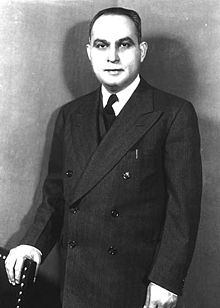Bolívar Pagán
| Bolívar Pagán Lucca | |
|---|---|
 |
|
| Member of the Puerto Rico Senate from the At-Large district |
|
|
In office 1933–1939 |
|
| Resident Commissioner of Puerto Rico | |
|
In office December 26, 1939 – January 3, 1945 |
|
| Preceded by | Santiago Iglesias Pantín |
| Succeeded by | Jesús T. Piñero |
| President pro tempore of the Senate of Puerto Rico | |
|
In office 1933–1939 |
|
| Preceded by | Celestino Iriarte Miró |
| Succeeded by | Luis Padrón Rivera |
| Personal details | |
| Born |
May 16, 1897 Guayanilla, Puerto Rico |
| Died | February 9, 1961 (aged 63) San Juan, Puerto Rico |
| Occupation | Politician, Senator, Historian, Journalist |
Bolívar Pagán Lucca (May 16, 1897 – February 9, 1961) was a Puerto Rican historian, journalist, and politician.
Pagán was born in Guayanilla, Puerto Rico. He received his primary education in the public schools of Adjuntas, and went to secondary school in the city of Ponce. While still in school in Ponce, he was a contributor to the newspapers El Día, Nosotros, Renacimiento, and Puerto Rico Ilustrado and editor to both La Idea and La Aurora. In 1919 Pagán became the vice president of the Socialist Party of Puerto Rico, a pro-statehood, pro-labor party (not to be confused with the Puerto Rican Socialist Party founded in the 1970s).
In 1921 he graduated with a law degree from the University of Puerto Rico at Rio Piedras; the same year he was admitted to the bar and began to practice law in San Juan. The following year he served as judge of Fajardo, Puerto Rico.
In 1924, Pagán ran unsuccessfully as a Socialist Party of Puerto Rico candidate for election to the Puerto Rican Senate. The following year, he began a four-year tenure as city treasurer of San Juan. In 1928, he ran again for the Puerto Rican Senate, but was not elected. He succeeded on his third try, and served as a member of the Puerto Rican Senate from 1933 until 1939, rising to leadership positions such as president pro-tempore and majority floor leader. While in the Puerto Rican Senate, he worked on legislation of social and cultural importance, such as universal suffrage, workers' compensation, and the creation of the Instituto de Literatura Puertorriqueña. He also served as city manager of San Juan, Puerto Rico in 1936 and 1937.
In 1939 Pagán was appointed Resident Commissioner to the U.S. House of Representatives by the Governor of Puerto Rico, William Leahy, to fill the vacancy caused by the death of Pagán's father-in-law, Santiago Iglesias. In 1940, he was elected Resident Commissioner under the auspices of a coalition between the Socialist Party and the Republican Union.
...
Wikipedia
